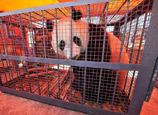
HEFEI, May 31 (Xinhua) -- Farmer Zhu Honghui and her husband have been struggling to make ends meet for years. However, when it comes to feeding their daughter, they are more than willing to spend a quarter of their income on foreign milk powder.
"She consumes one can, which sells for more than 100 yuan (16.3 U.S.dollars), a week. We're doing our best to make sure we can afford it for the sake of her health," said Zhu, a resident of the city of Fuyang in east China's Anhui Province.
Zhu, like many parents in Fuyang, still distrusts domestic milk powder even a decade after some local retailers sold cheap, substandard baby formula to impoverished families. Twelve infants perished from malnutrition after consuming the low-quality formula.
Local parents, many of whom still live in poverty, are struggling to find ways and means to obtain imported formula.
Zhu's husband, who works odd jobs in Beijing and earns some 2,000 yuan a month, regularly purchases foreign milk powder in bulk at supermarkets in Beijing to send home.
Rong Gang, a migrant worker from Fuyang who also works in Beijing, carries a suitcase packed with milk powder every time he returns home.
"We've tried five different foreign brands within a year. We don't know which one is the best, but simply believe that the more expensive, the better," Rong said.
Before the fake formula scandal erupted, local residents would often purchase low-quality milk powder for only 8 yuan a can, said Liu Xiaolin, chief of pediatrics at the People's Hospital of Fuyang.
Liu recalled that in summer of 2003, the hospital admitted several malnourished infants. Over 200 infants became ill after drinking fake formula that contained as little as one-eight of the required amount of protein, Liu said.
The incident resulted in punishment for unscrupulous milk powder manufacturers and the sacking of several local officials. It also sparked widespread concern over the safety of domestic milk brands.
The worries were reinforced by a contaminated milk powder scandal in 2008 that led to the deaths of six infants. The incident effectively destroyed the reputation of the domestic dairy industry.
Most of the babies who became sick in Fuyang in 2003 were in the care of their grandparents, as their parents had left to work in bigger cities. The elderly caretakers had poor understanding of the danger of fake food, Liu said.
Some mothers in Fuyang subsequently opted to stay home and care for their infants themselves at the cost of earning less pay by working far from home.
 |
















 Learning to be a perfect lady proves fruitful
Learning to be a perfect lady proves fruitful


![]()
